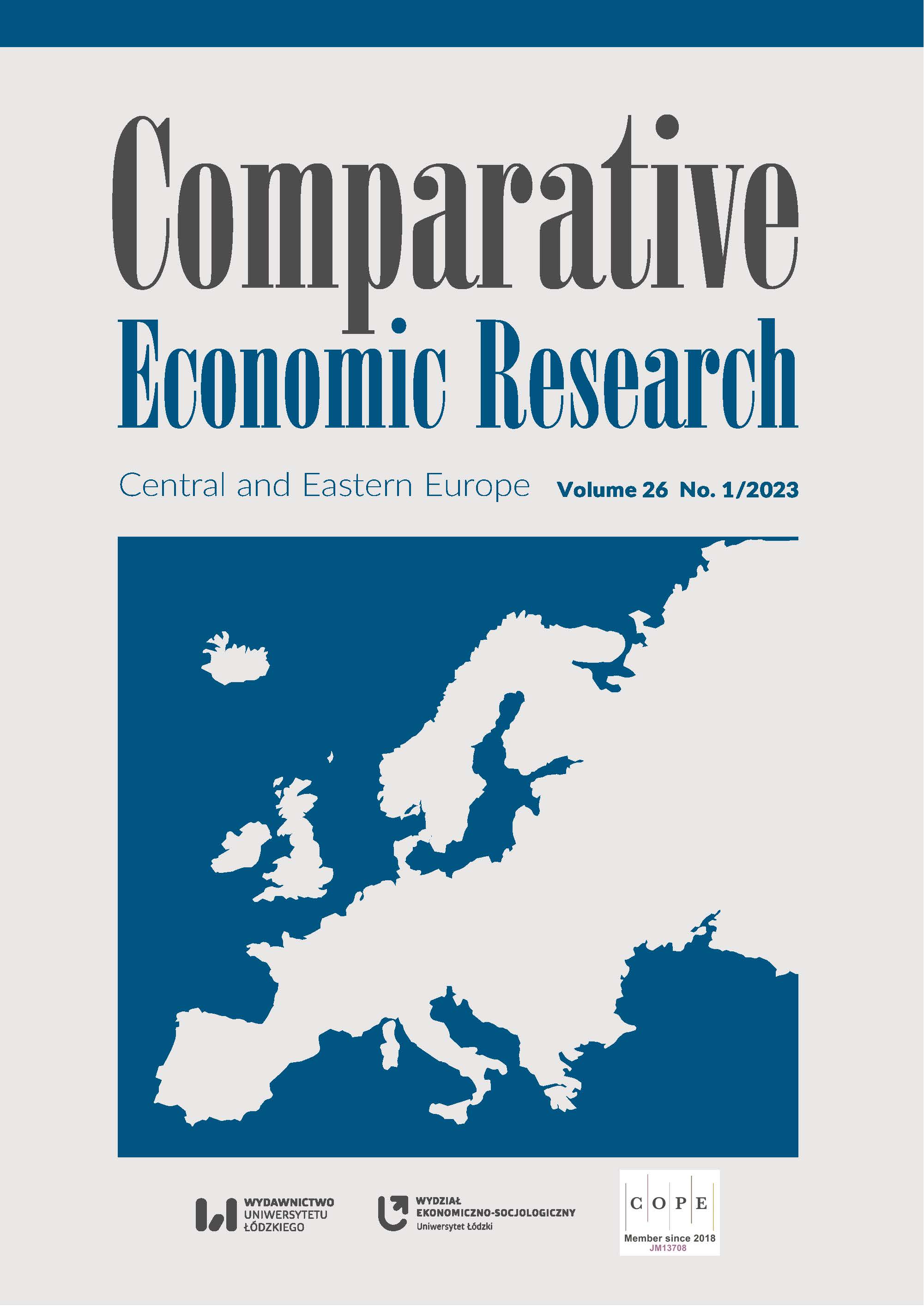The Role of FDI in the Sustainable Development of the European Union
DOI:
https://doi.org/10.18778/1508-2008.26.02Keywords:
foreign direct investment, sustainable development, European Union, ecological issuesAbstract
This paper aims to examine the role of international business behavior in the sustainable development of the European Union (EU) and to answer two questions: (1) To what degree could international business contribute to the development of a “green economy” under the uncertainty caused by the COVID–19 pandemic?; (2) In what way could host countries attract “green” and socially responsible foreign direct investment (FDI)?
The statistical analysis of international business involvement in environmentally harmful sectors/industries of the EU economy indicates that the share of such investments in most member states did not exceed 20% of the total FDI stocks between 2015 and 2020. The structure of investments changed in half of the analyzed countries towards sectors/industries that were less harmful to the environment. These changes and high requirements for domestic and foreign companies within the framework of the EU’s environmental policy allow us to conclude that international business contributed to the ecological transformation of the EU.
On the other hand, changes in the structure of FDI stocks located abroad by the EU Member States in environmentally harmful sectors/industries were multidirectional. Six of the EU states remained net exporters of direct investment in these sectors/industries. The involvement of foreign direct investors in the new EU Member States in sectors that are important for implementing the Sustainable Development Goals (SDGs) of the 2030 Agenda was not very high. It was characterized by high volatility and did not play a significant role in their economies. Attracting “green FDI” and socially responsible investments requires changes in policy towards foreign investors. They should include facilitating foreign investment, including investments aimed at sustainable development, incentives for investors to engage in “green investments”, and making investment agreements more flexible to combat climate change.
Downloads
References
Budnikowski, A. (1998), Ochrona środowiska jako problem globalny, PWE, Warszawa.
Google Scholar
Carroll, A.B., Shabana, K.M (2010), The Business Case for Corporate Social Responsibility: A Review of Concepts, Research and Practice, “International Journal of Management Reviews”, 12 (1), pp. 85–105, https://doi.org/10.1111/j.1468-2370.2009.00275.x
Google Scholar
DOI: https://doi.org/10.1111/j.1468-2370.2009.00275.x
European Commission (2011), Communication from the Commission to the European Parliament, the Council, the European Economic and Social Committee and the Committee of the Regions, A renewed EU strategy 2011–14 for Corporate Social, Brussels, 25.10.2011, COM(2011) 681 final, https://eur-lex.europa.eu/legal-content/EN/TXT/PDF/?uri=CELEX:52011DC0681&from=EN (accessed: 15.02.2022).
Google Scholar
European Commission (2019), Corporate Social Responsibility, Responsible Business Conduct, and Business and Human Rights, Overview of Progress, https://ec.europa.eu/docsroom/documents/34963 (accessed: 13.02.2022).
Google Scholar
European Commission (2022), Sustainable development, https://policy.trade.ec.europa.eu/development-and-sustainability/sustainable-development_en (accessed: 13.02.2022).
Google Scholar
European Union (2019), Regulation (EU) 2019/452 of the European Parliament and of the Council of 19 March 2019 establishing a framework for the screening of foreign direct investments into the Union, Official Journal of the European Union, L 79 I/1, 21.3.2019, https://eur-lex.europa.eu/legal-content/EN/TXT/PDF/?uri=CELEX:32019R0452&from=EN (accessed: 15.02.2022).
Google Scholar
Kawecka-Wyrzykowska, E. (2020), A new industrial policy in the EU: in search for a new paradigm of public intervention, [in:] A.A. Ambroziak (ed.), New Challenges for the European Union’s Industrial Policy: Climate Change, Servitisation, Digitalisation, SGH Publishing House, Warszawa, pp. 11–36.
Google Scholar
Nimac, I.A. (2020), COVID–19 and FDI: How should governments respond?, “Columbia FDI Perspectives”, 288.
Google Scholar
OECD (1999), Foreign Direct Investment and the Environment, Paris.
Google Scholar
OECD (2021), OECD International Direct Investment Statistic 2020, https://www.oecd-ilibrary.org/finance-and-investment/oecd-international-direct-investment-statistics-2020_e6696186-en (accessed: 20.02.2022).
Google Scholar
Oman, Ch. (2000), Policy Competition for Foreign Direct Investment. A Study of Competition among Governments to Attract FDI, OECD, Paris, https://doi.org/10.1787/9789264181083-en
Google Scholar
DOI: https://doi.org/10.1787/9789264181083-en
Sauvant, K.P., Gabor, E. (2021), Facilitating Sustainable FDI for Sustainable Development in a WTO Investment Facilitation Framework: Four Concrete Proposals, “Journal of World Trade”, 55, pp. 261–286, https://papers.ssrn.com/sol3/papers.cfm?abstract_id=3496967 (accessed: 10.02.2022).
Google Scholar
DOI: https://doi.org/10.54648/TRAD2021010
Sauvant, K.P., Stephenson, M., Kagan, Y. (2021), Green FDI: Encouraging carbon-neutral investment, “Columbia FDI Perspectives”, 316.
Google Scholar
Stephenson, M. (2021), Launching a program for investment partnerships, “Columbia FDI Perspectives”, 319.
Google Scholar
TFEU (2012), The Treaty on the Functioning of the European Union (Consolidated version), “Official EN Journal of the European Union”, C 326/47, 26.10.2012, https://eur-lex.europa.eu/legal-content/EN/TXT/PDF/?uri=CELEX:12012E/TXT&from=EN (accessed: 15.02.2022).
Google Scholar
Thrasher, R. (2021), Room to move: Building flexibility into investment treaties to meet climate-change commitments, “Columbia FDI Perspectives”, 296.
Google Scholar
UN/UNCTAD (2016), World Investment Report 2016. Investor Nationality: Policy Challenges, Geneva, https://unctad.org/system/files/official-document/wir2016_en.pdf (accessed: 10.02.2022).
Google Scholar
UN/UNCTAD (2019), World Investment Report 2019. Special Economic Zones, Overview, Geneva, https://unctad.org/system/files/official-document/wir2019_en.pdf (accessed: 10.02.2022).
Google Scholar
UN/UNCTAD (2021a), World Investment Report 2021. Investing in Sustainable Recovery, Overview, Geneva, https://unctad.org/system/files/official-document/wir2021_overview_en.pdf (accessed: 11.02.2022).
Google Scholar
UN/UNCTAD (2021b), World Investment Report 2021. Investing in Sustainable Recovery, Geneva, https://unctad.org/system/files/official-document/wir2021_en.pdf (accessed: 11.02.2022).
Google Scholar
UNCTAD (1999), World Investment Report 1999. Foreign Direct Investment and the Challenge of Development, New York–Geneva, https://unctad.org/system/files/official-document/wir1999_en.pdf (accessed: 12.02.2022).
Google Scholar
UNCTAD (2022), Global FDI rebounds strongly in 2021, but recovery highly uneven, “Investment Trends Monitor”, 40, https://unctad.org/system/files/official-document/diaeiainf2021d3_en.pdf (accessed: 15.02.2022).
Google Scholar
Witkowska, J. (2011), Foreign Direct Investment and Sustainable Development in the New EU Member States: Environmental Aspects, “Comparative Economic Research. Central and Eastern Europe”, 14 (3), pp. 5–23, https://doi.org/10.2478/v10103-011-0016-0
Google Scholar
DOI: https://doi.org/10.2478/v10103-011-0016-0
World Trade Organization (2021), Ministerial Statement on Fossil Subsidies, https://docs.wto.org/dol2fe/Pages/SS/directdoc.aspx?filename=q:/WT/MIN21/9R1.pdf&Open=True (accessed: 11.02.2022).
Google Scholar
World Trade Organization (2022), Joint Initiative on Investment Facilitation for Development, https://www.wto.org/english/thewto_e/minist_e/mc12_e/briefing_notes_e/bfinvfac_e.htm (accessed: 8.02.2022).
Google Scholar
Wysokińska, Z., Witkowska, J. (2004), Handel i inwestycje zagraniczne a zrównoważony rozwój, Wydawnictwo Uniwersytetu Łódzkiego, Łódź.
Google Scholar
Zahn, J. (2021), Global FDI prospects for 2021–2022, https://www.fdiintelligence.com/content/opinion/global-fdi-prospects-for-20212022-80145 (accessed: 18.01.2022).
Google Scholar
Downloads
Published
How to Cite
Issue
Section
License

This work is licensed under a Creative Commons Attribution-NonCommercial-NoDerivatives 4.0 International License.











